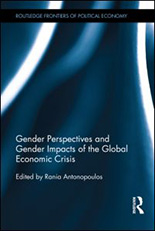
Research Topics
Publications on Gender studies
-
Social Security and Gender Inequality
Working Paper No. 1045 | March 2024This inquiry examines the role of federal policy in gender inequality using the principles of institutional adjustment (Foster 1981; Bush 1987) in the context of the Veblenian dichotomy of habit formation. Specifically, the authors assert that Social Security, though exclusive at its inception in 1935, has undergone significant institutional adjustment. Today, Social Security plays a determining role in providing the appropriate institutional space for not only increasing economic security for older women, but also for reducing gender inequality overall. -
Structural Change and Gender Sectoral Segregation in Sub-Saharan Africa
Working Paper No. 1027 | August 2023Structural change has long been at the core of economic development debates. However, the gender implications of structural change are still largely unexplored. This paper helps to fill this gap by analyzing the role of structural change in the gender distribution of sectoral employment in sub-Saharan African countries. I employ aggregate and disaggregate measures of gender sectoral segregation in employment on a panel database consisting of 10 sectors and 11 countries during 1960–2010. Fixed effects and instrumental variables’ regression models show a significant, non-linear link between labor productivity and gender segregation. Increasing labor productivity depresses gender segregation at initial phases of structural change. However, further productivity gains beyond a certain threshold of sectoral development increases gender segregation. Country-industry panel data models complement the analysis by considering relative labor productivity as a determinant of sectoral feminization. The estimates suggest that manufacturing, utilities, construction, business, and government services are key to correcting gender biases in employment along the process of structural change.Download:Associated Program:Author(s):Izaskun Zuazu -
Gender Perspectives and Gender Impacts of the Global Economic Crisis
Book Series, December 2013 | December 2013Edited by Rania Antonopoulos

With the full effects of the Great Recession still unfolding, this collection of essays analyzes the gendered economic impacts of the crisis. The volume, from an international set of contributors, argues that gender-differentiated economic roles and responsibilities within households and markets can potentially influence the ways in which men and women are affected in times of economic crisis.
Looking at the economy through a gender lens, the contributors investigate the antecedents and consequences of the ongoing crisis as well as the recovery policies adopted in selected countries. There are case studies devoted to Latin America, transition economies, China, India, South Africa, Turkey, and the United States. Topics examined include unemployment, the job-creation potential of fiscal expansion, the behavioral response of individuals whose households have experienced loss of income, social protection initiatives, food security and the environment, shedding of jobs in export-led sectors, and lessons learned thus far. From these timely contributions, students, scholars, and policymakers are certain to better understand the theoretical and empirical linkages between gender equality and macroeconomic policy in times of crisis.
Published by: Routledge
